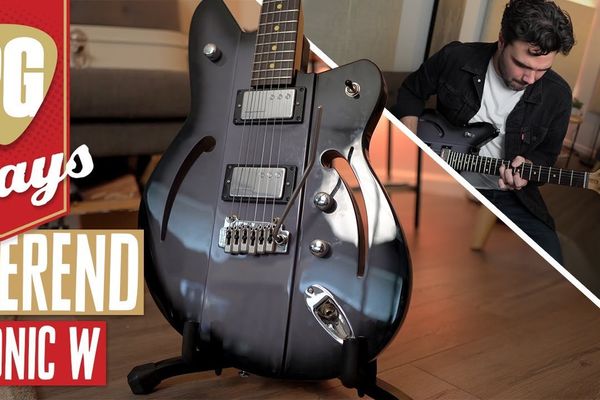Get the real scoop on life on the road from seven guys who have worked for Eric Clapton, Johnny Cash, Alex Lifeson, Billy Gibbons, Joe Perry, John Petrucci, and more.
Most pro guitarists entrust their live tone to a lone man working on the edge of the stage’s spotlight. Just like high-profile celebrities who hire nannies to watch their kids while doing interviews, acting, traveling, and all the other glamorous tasks associated with being a 21st century superstar, guitarists need help, too. It doesn’t mean the glitterati love their kids any less, and the same can be said for guitarists and their gear. From night to night and city to city, artists have a litany of responsibilities beyond rockin’ on the stage—radio gigs, in-store appearances, clinics, and meet-and-greets—so they can’t give their children the proper care and attention they need to survive the rigors of the road. Enter the guitar tech.
Besides facilitating guitar switches and reconnecting patch cables, the guitar tech—the good ones—are secret-service-level gear nannies. They are living, breathing insurance policies for guitarists’ most treasured possessions. “My most important job is to keep Warren happy, comfortable, and the gear safe,” says Brian Farmer, longtime tech for Warren Haynes. “The best thing and number one key to a good relationship between a tech and his guitarist is trust. He trusts me that I’ll have his guitar feeling like the night before. He trusts that all his gear—new or vintage—will be in top form through all the traveling. He trusts me that I’ll have him in his stage pocket at every venue and stage… and I trust he’ll pay me once and a while [laughs].”
While the job is based on a sworn commitment to protect and to serve the rig at all costs, friendships and bonds are naturally a big part of the tech and guitarist relationship. “Not only did we hit it off and mesh real well on a personal level, but our mutual love for gear and tone has made this work out so well,” recalls Mike Buffa, tech for James Valentine of Maroon 5. “He trusts my tone-based suggestions because I know James is very serious about his gear and sound. It’s a respect thing between James and I. He’s become family.”
PG recently caught up with seven guitar techs and talked to them about road life, how they fell into the career, and why they’re still doing it after all these years. Also, be sure to come back for next week when we unleash part two of the tech spotlight by providing 10 must-know tone tips and setup guidelines as prescribed by some of the industries most important gear nannies.
But first, meet our panel of experts:
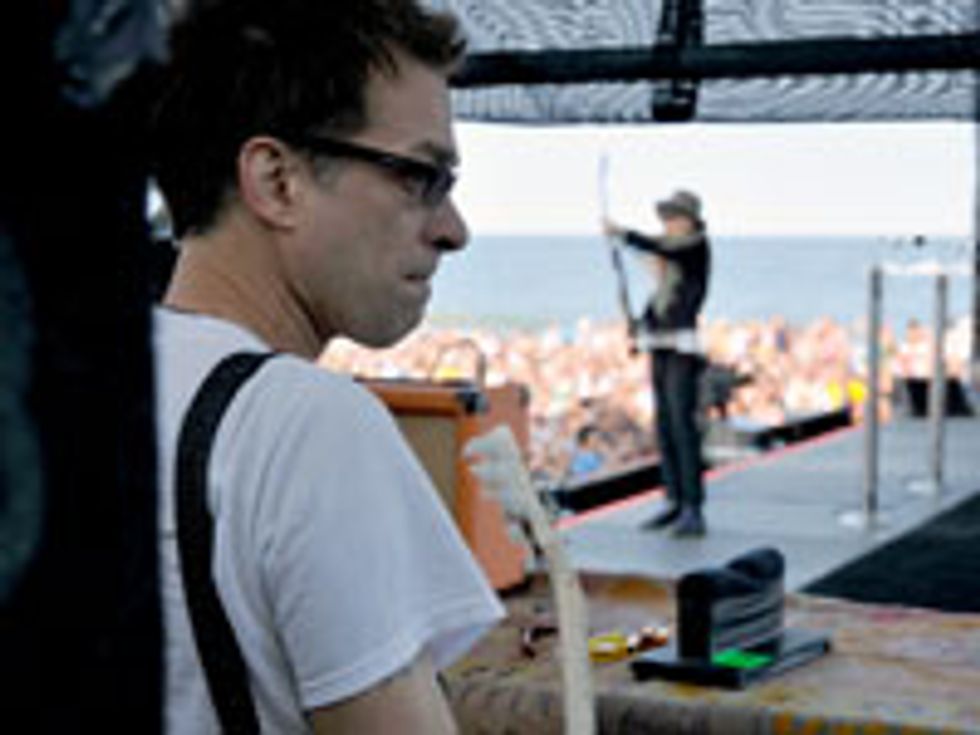
Years of Service: 28
Past Gigs: Joe Perry, Steve Vai, Puddle of Mud, Izzy Stradlin and Gilby Clarke [Guns ‘N’ Roses], Rich Robinson of The Black Crowes
Current Job: ZZ Top’s Billy Gibbons
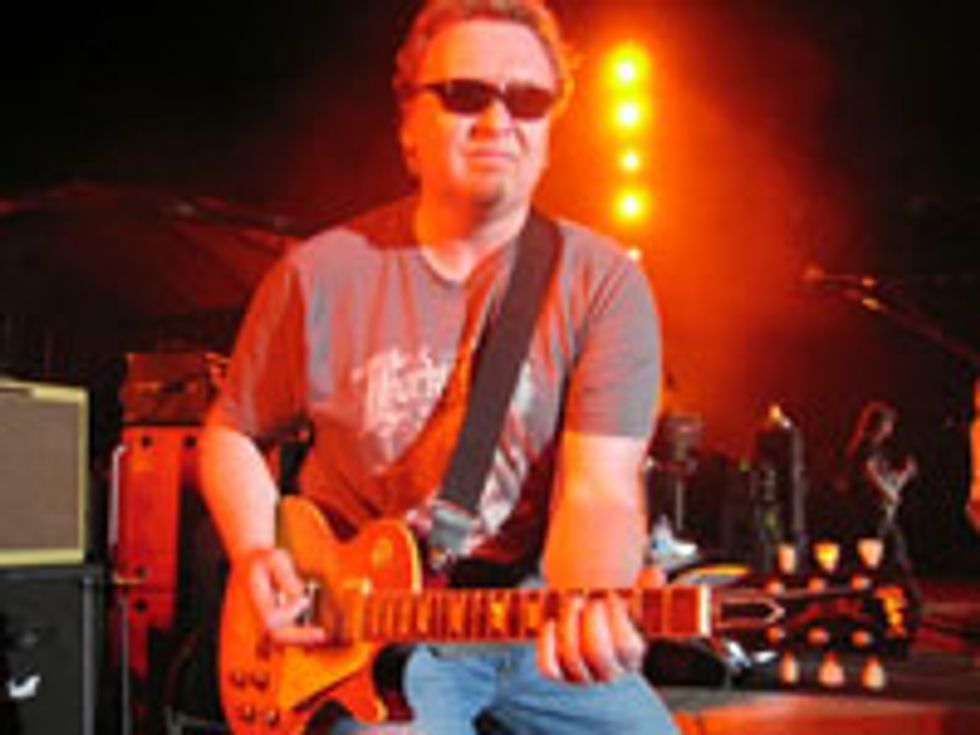
Years of Service: 20 years, last 11 full-time
Past Gigs: Neal Schon of Journey, KD Lang, Styx, The B-52s, and Peter Frampton
Current Job(s): Def Leppard’s Phil Collen and Rush’s Alex Lifeson
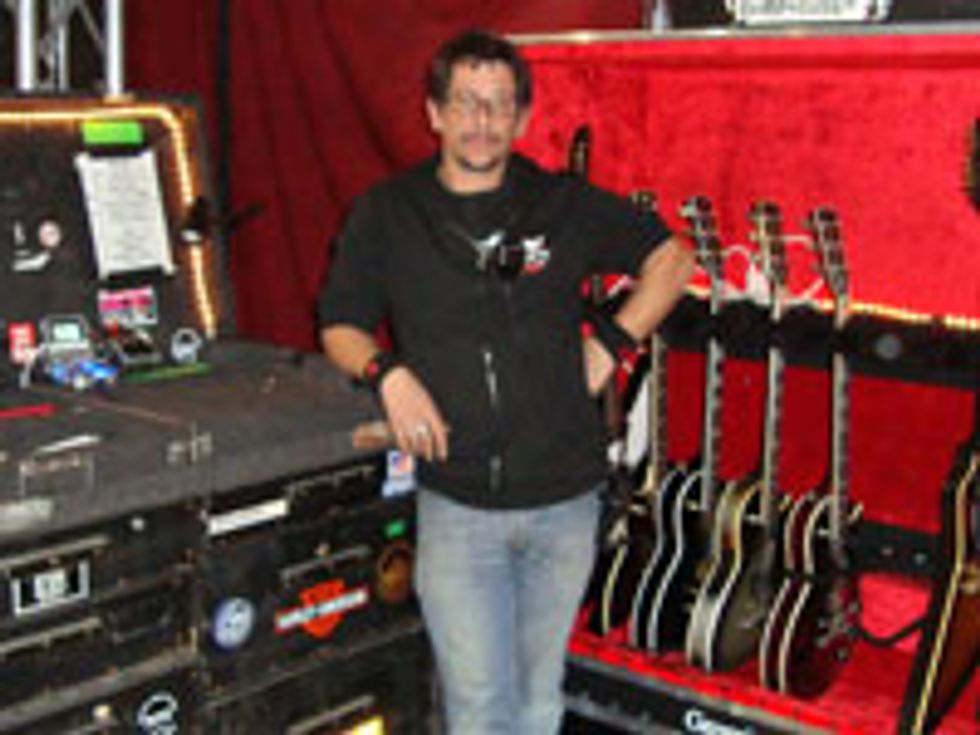
Years of Service: 24
Past Gigs: Blondie, Megadeth, Cold, Fuel, Clutch, Godsmack, Meatloaf, Extreme
Current Job: Bill Kelliher of Mastodon, Weezer
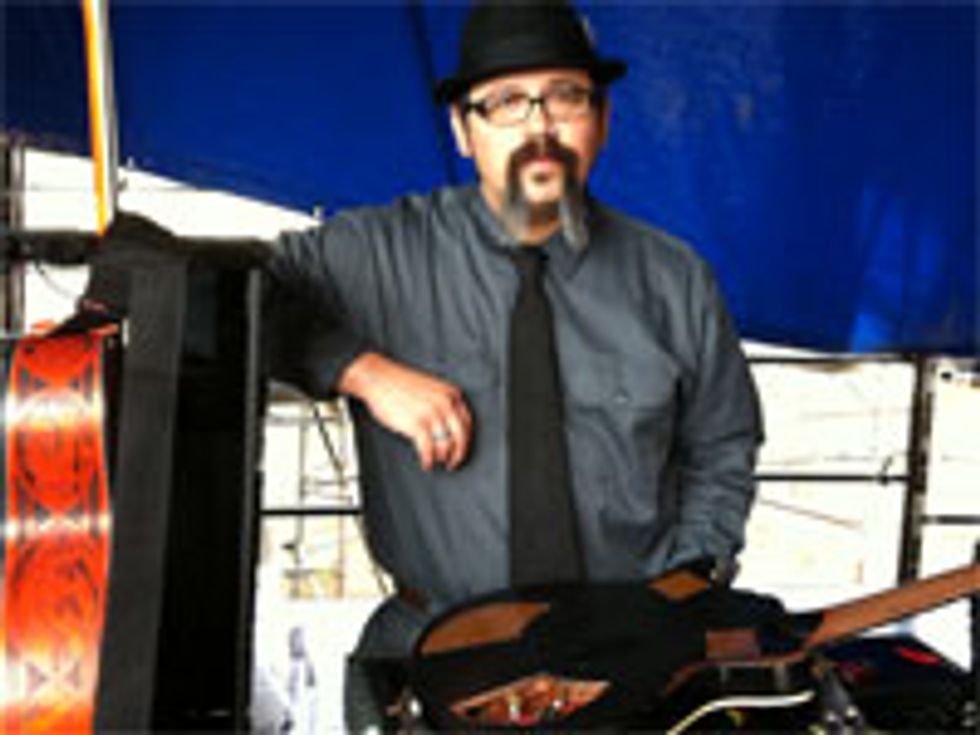
Years of Service: 14
Past Gigs: At the Drive-In
Current Job: The Mars Volta’s Omar Rodriguez-Lopez,The Raconteurs
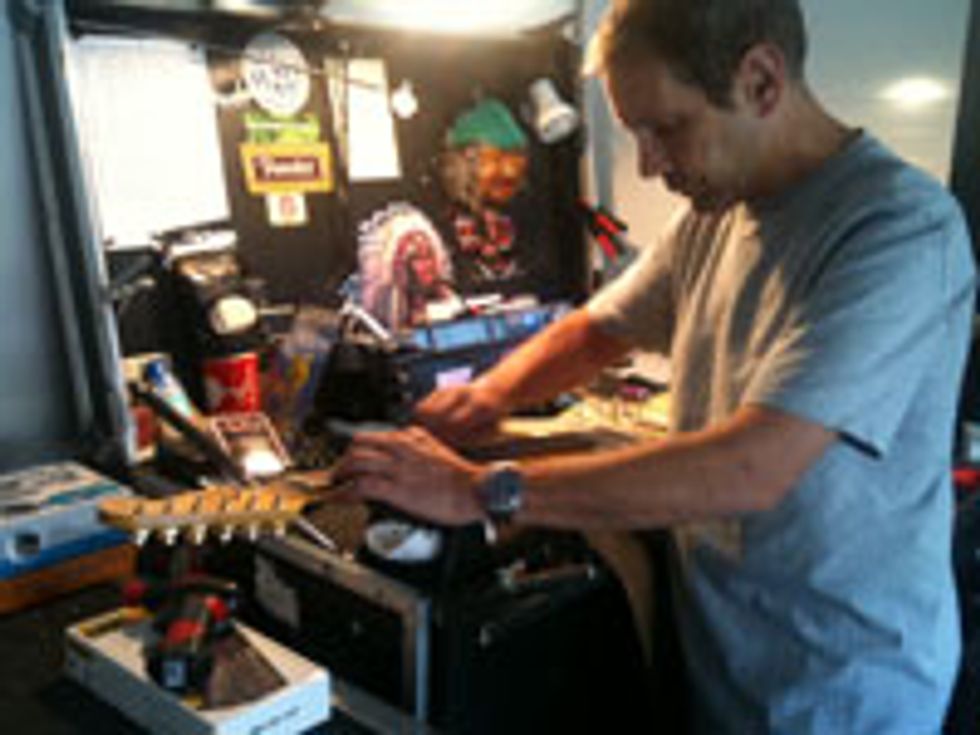
Years of Service: 32 (’79–’10)
Past Gigs: Eric Clapton
Current Job: Off
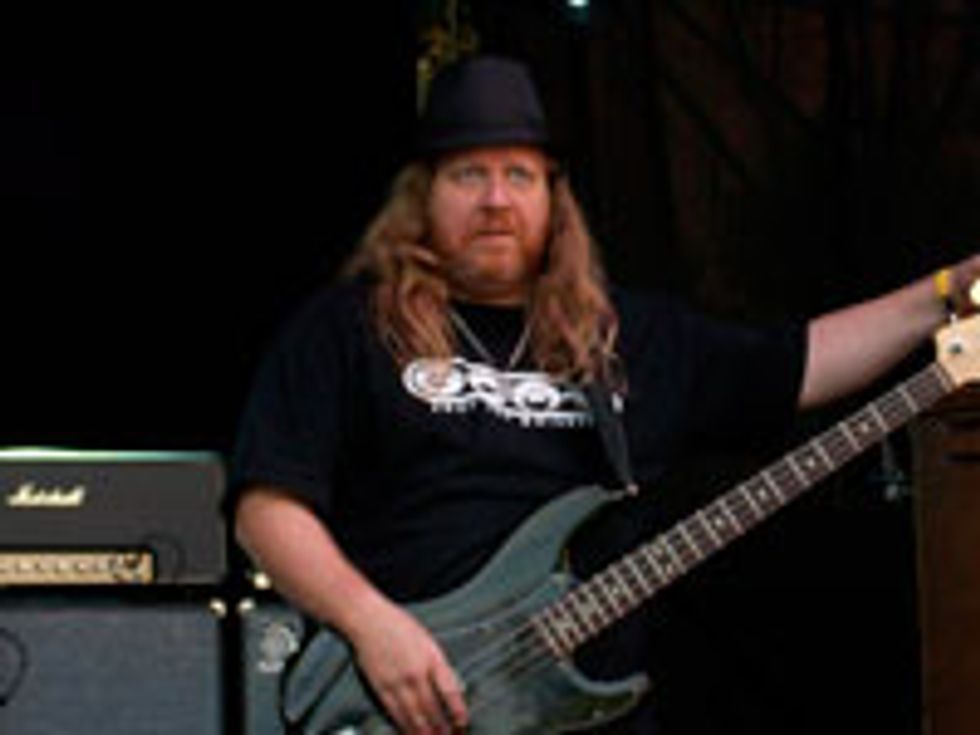
Years of Service: 23
Past Gigs: Marty Stuart, Johnny Cash, Allen Woody
Current Job: Warren Haynes/Gov’t Mule
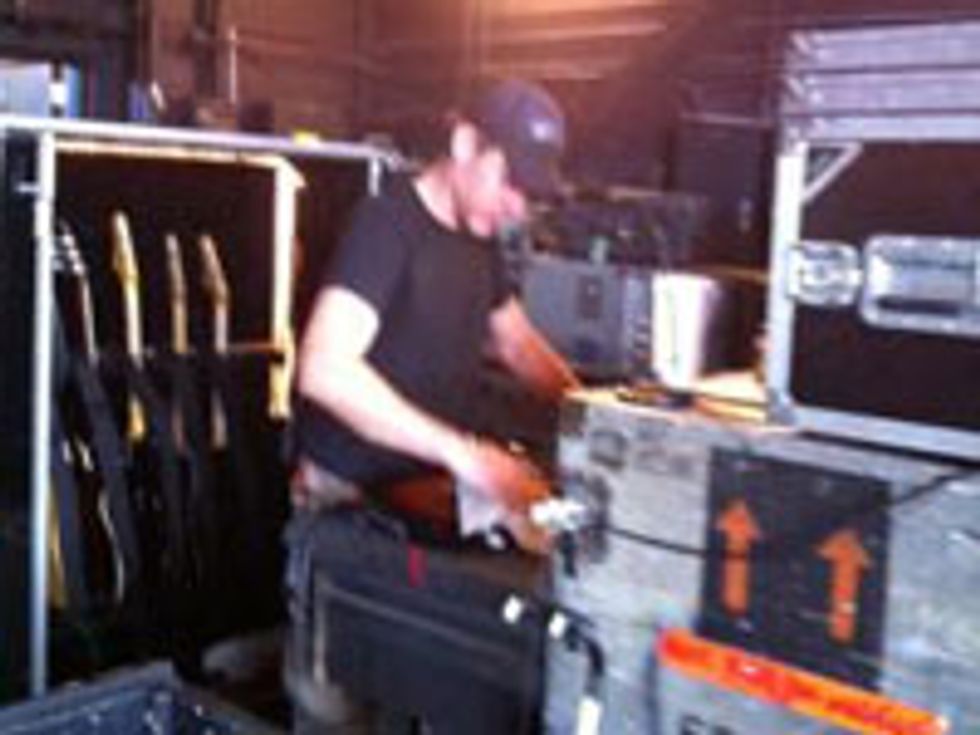
Years of Service: 17
Past Gigs: John Petrucci and John Myung of Dream Theater, Vernon Reid, Stevie Nicks, Chris Chaney [Jane’s Addiction/Alanis Morissette]
Current Job: Maroon 5’s James Valentine
Ned Ryerson—Bing!
A touring guitar tech’s life can be summed up as a real-life version of the movie Groundhog Day. City to city and show to show, it’s the same thing in different area codes. “I get up in the morning—in a different city than when I went to bed in—and go for a bike ride trying to find a coffee shop and kill some time until we have to load-in and prep for soundcheck,” says Mike Buffa, tech for Maroon 5’s James Valentine. But once work starts, it’s time to get dirty… er clean. “I spend a lot of my time prepping the amps by dusting the tubes and inside the chassis, and restringing and setting up each guitar and intonating as best I can up and down the neck. [Laughs] I’ve become so anal that I bring cans of compressed air to spray off James’ pedalboard—dust is my worst enemy.”
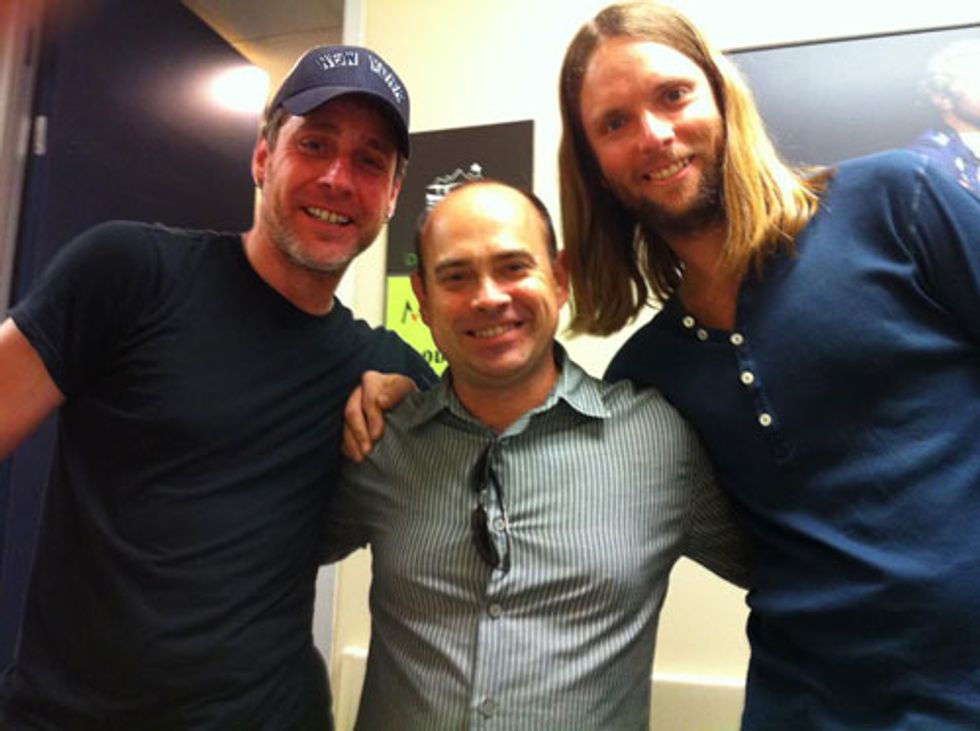
Buffa (left) with Matchless' Phil Jamison (middle) and Maroon 5's James Valentine (right).
Part of a tech's job is to help work with the gear builders to fine-tune the guitarist's tone.
Many guitarists who spend a lot of time on the road find that venturing to favorite retailers and meeting builders at the show’s host city are a good way to release some G.A.S. And soundcheck is the best tool for testing out new gear. “If and when James finds a new guitar or stompbox he likes and is digging, he’ll spend time with it on the bus and backstage for a few days. If he eventually comes to me with it, I know he’s digging it,” says Buffa. “At this point, we use soundchecks over a span of a few days to figure out how the guitar or pedal should be set up and used, and for guitars, we’ll discuss how it will be worked into the setlist rotation and what it’ll replace.”
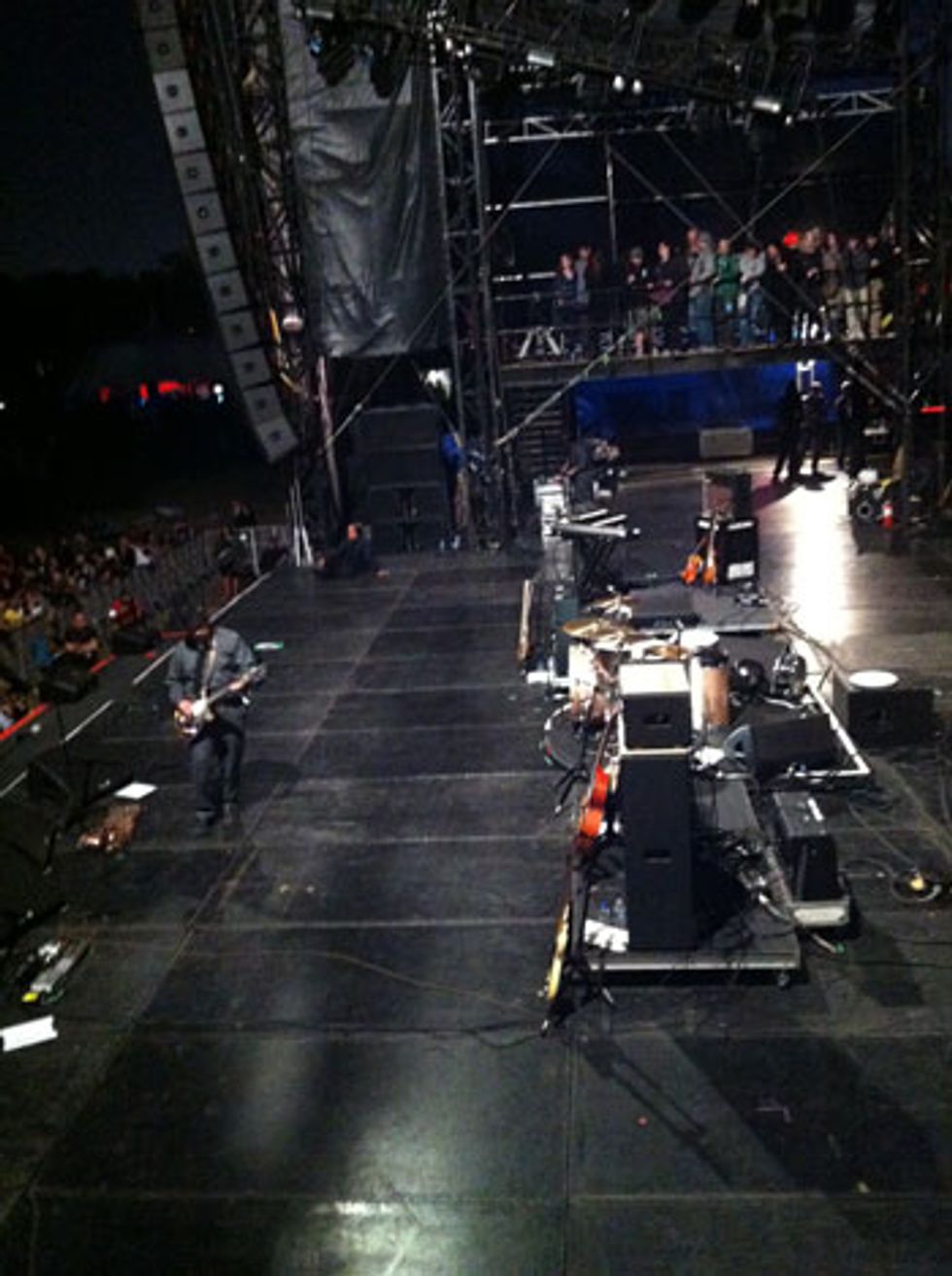 Henry “Enrique” Trejo, 14-year tech for The Mars Volta’s Omar Rodr’guez-L—pez, checks guitars onstage at a Raconteurs Voodoo Fest show. |
“No matter how bad you may want to or how natural it feels, never, ever set a drink on your amp,” warns Lee Dickson, former longtime guitar tech for Eric Clapton. “That’s something a gentlemen never does.”
Once the show starts, the tech is all eyes and ears, attentively watching from their bunker sidestage. “I can watch Warren’s face and his hands and know if the guitar is setup perfect or if he’s struggling or fighting the guitar—I can sense that in his playing now,” says Brian Farmer, tech for Warren Haynes. And if a string breaks or a stompbox goes down, the tech is right there with the correct backup immediately. “Knowledge is power—and knowing where your backup is for each part of the signal chain is the most calming thing any tech, new or old, should be aware of,” says Farmer.
“I can be out there and swipe out a stompbox on James’ pedalboard before anyone in the crowd even knows something is wrong—that’s one of my biggest goals every night if something does go down… repairing without recognition,” says Buffa.
“One thing I’ll never forget, Mr. [Johnny] Cash told me not to run out their like it was a Chinese fire drill. He said act like you’ve been there before and do the job right the first time,” recalls Farmer.
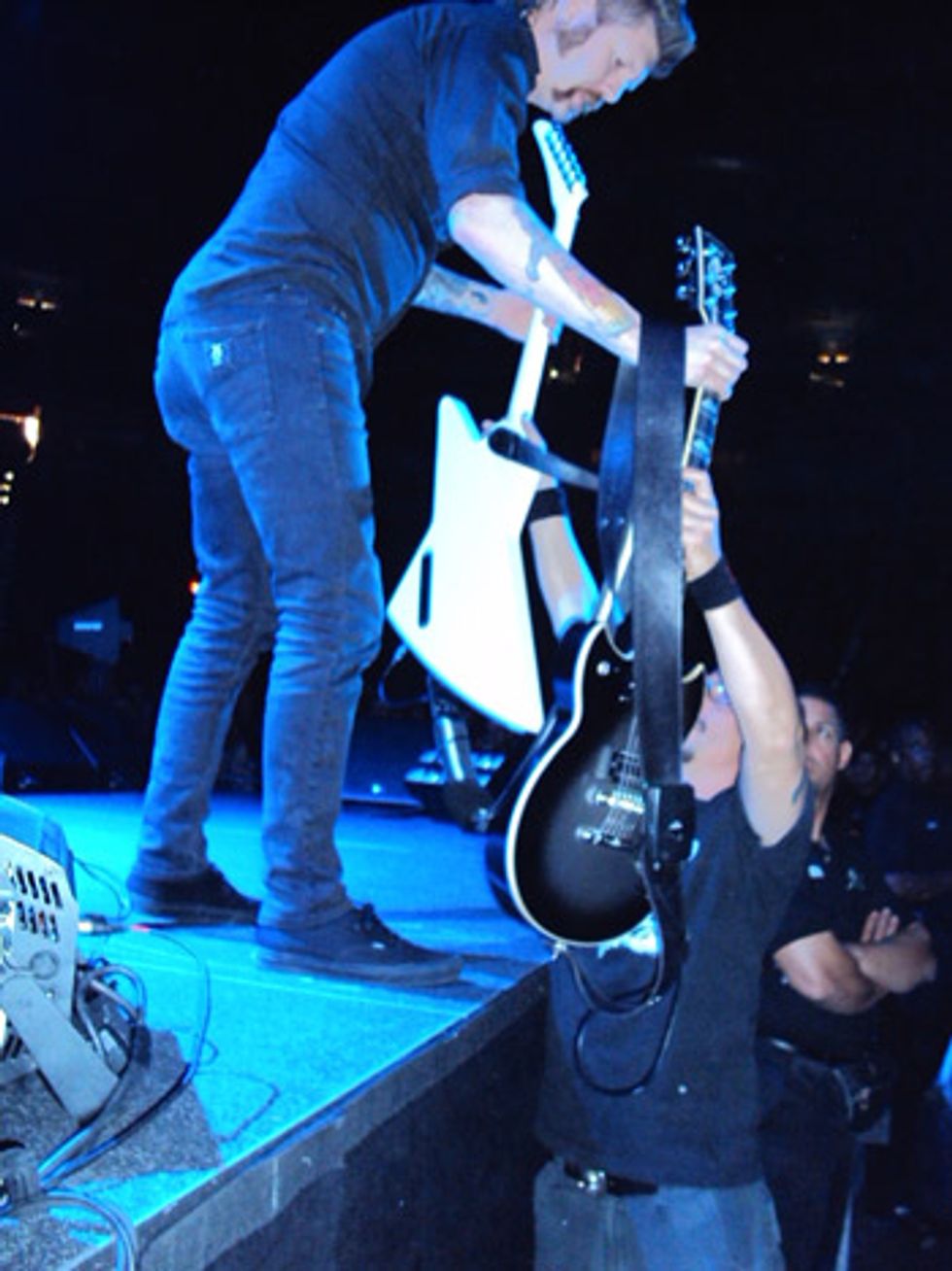
Warren Termini swaps guitars with Bill Kelliher mid-set at a Mastodon show.
However, there are times when it can’t wait until the end of a song or convenient drum solo. “One of the opening bands that was on the road with Godsmack had a broken guitar string,” recalls Warren Termini, current tech for Bill Kelliher of Mastodon. “I realized he didn’t even have another guitar, so I went out in front of the crowd and changed the string while he was playing… [laughs] it had to be done.”
Once the show is over, the tech cleans everything off one last time, carefully packs it all up and loads into the truck. The stage crew piles into their own bus and calls it a night generally between 1 a.m. and 3 a.m. on show nights. They fall asleep and wake up in a new city and start the process all over again.
Hey, where are all the job listings for guitar techs?
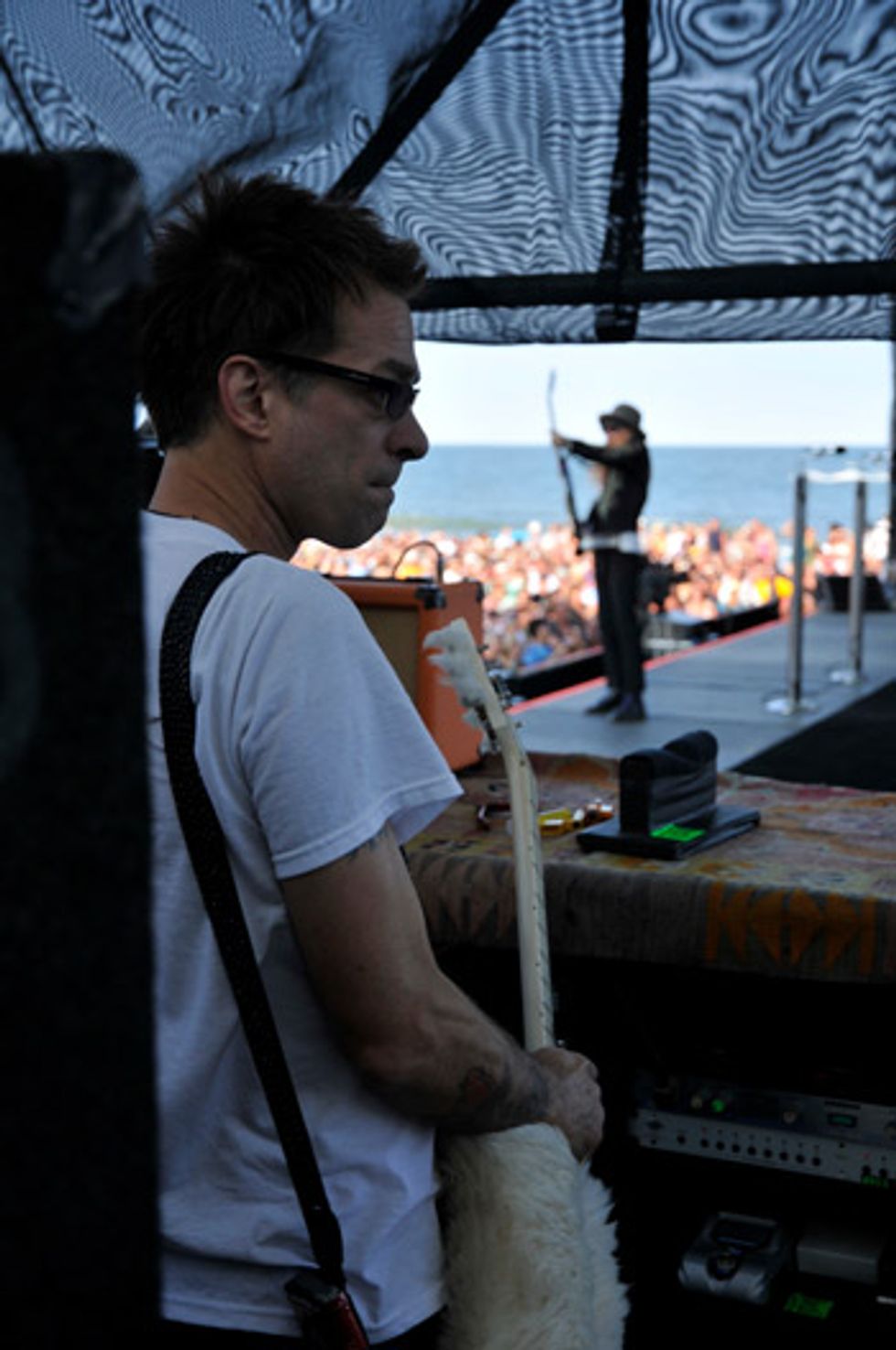 Tech Elwood Francis stands at the ready with Billy Gibbons' famous fur guitar as the Rev wows the crowd. |
Many techs evolve into their position from other music-related gigs. “I’ve been everything from security to horn tech [laughs],” remembers Henry “Enrique” Trejo, 14-year tech for The Mars Volta’s Omar Rodr’guez-L—pez. “I’ve always known that I wanted to be in the music business in some aspect—guitar tech is what has kind of stuck. I have no formal training—just real life road experience.”
“I used to hang around with Mark Synder when he was working the East Coast for Mesa/Boogie and he really got me into working and building racks,” says Buffa. “Then he was double-booked with a Dream Theater tour in Asia and a Living Colour tour in South American in ’94, so he asked me to go to Brazil and close out that tour with Vernon Reid. He showed me the rig and how everything would work the first night and then I did two more shows by myself and had a week to myself in Brazil—I was hooked after that.”
Others have always had a wayfarer’s take on life and just looked for the perfect opportunity and reason not to stay in one spot for longer than 24 hours. “My older brother Lee was a musician and he took me out on the road when I was a kid and I just fell in love with life on the road,” recalls Farmer. “I think I’m part gypsy or something because I hate being in one spot for a very long time.”
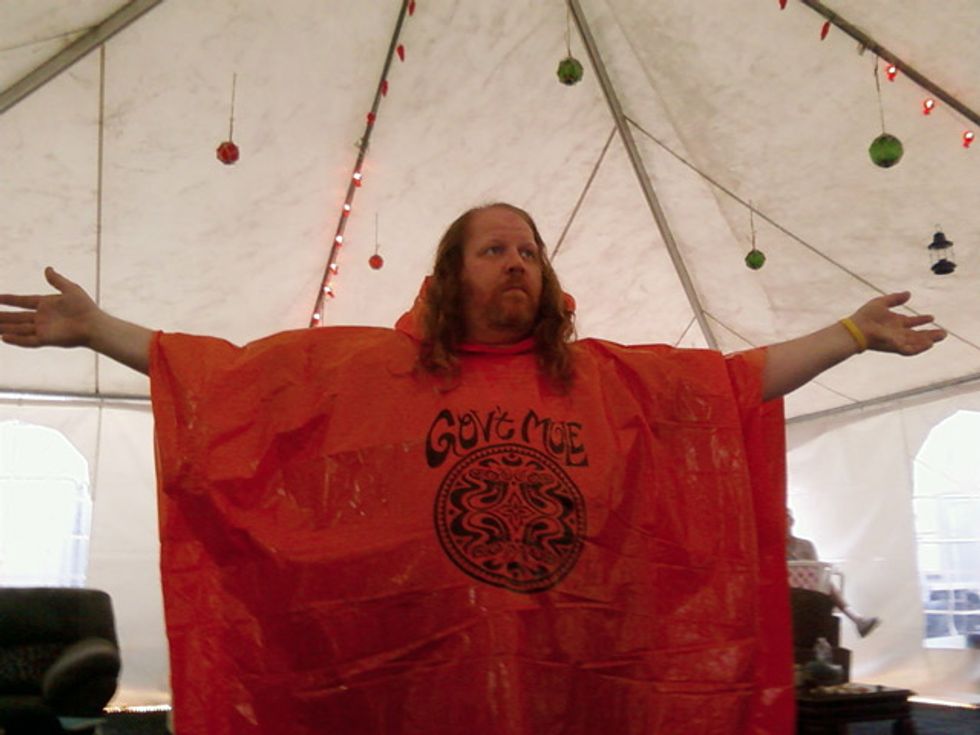
Farmer clearly revels in life on the road, making the most of a particularly wet gig with his Gov't Mule poncho
“As a worshiper of the guitar, in the back of my mind, guitar tech was the best job to have on a touring crew escaping from reality,” says Dickson. “The nomadic lifestyle and guitars were job satisfaction maximus.”
And sometimes, it just clicks on a player level. “I’m a player and play in bands in Nashville when I’m not touring,” says Scott Appleton, guitar tech for Phil Collen and Alex Lifeson. “I get to work with two of the world’s best guitarists who give me an incredible insight, perspective, and approach to guitar and tone I would have never gotten if I hadn’t become a tech. [Laughs] I get to learn from the best.”
One key to landing a teching gig—just like any in any career—is networking. Whether it’s piggybacking with a sibling who already has a foot in the door or simply sparking a conversation with a struggling guitarist in your local watering hole, in techdom everyone knows someone.
“My brother Toby was mixing front of house for the Joe Perry Project in ’83 and I just got to know Joe because we always talked guitars,” says Francis. “At one point he needed a tech and because we had covered the topic so much, Joe approached me about teching for him and I’ve been doing it ever since. [Laughs] He trained me pretty well.”
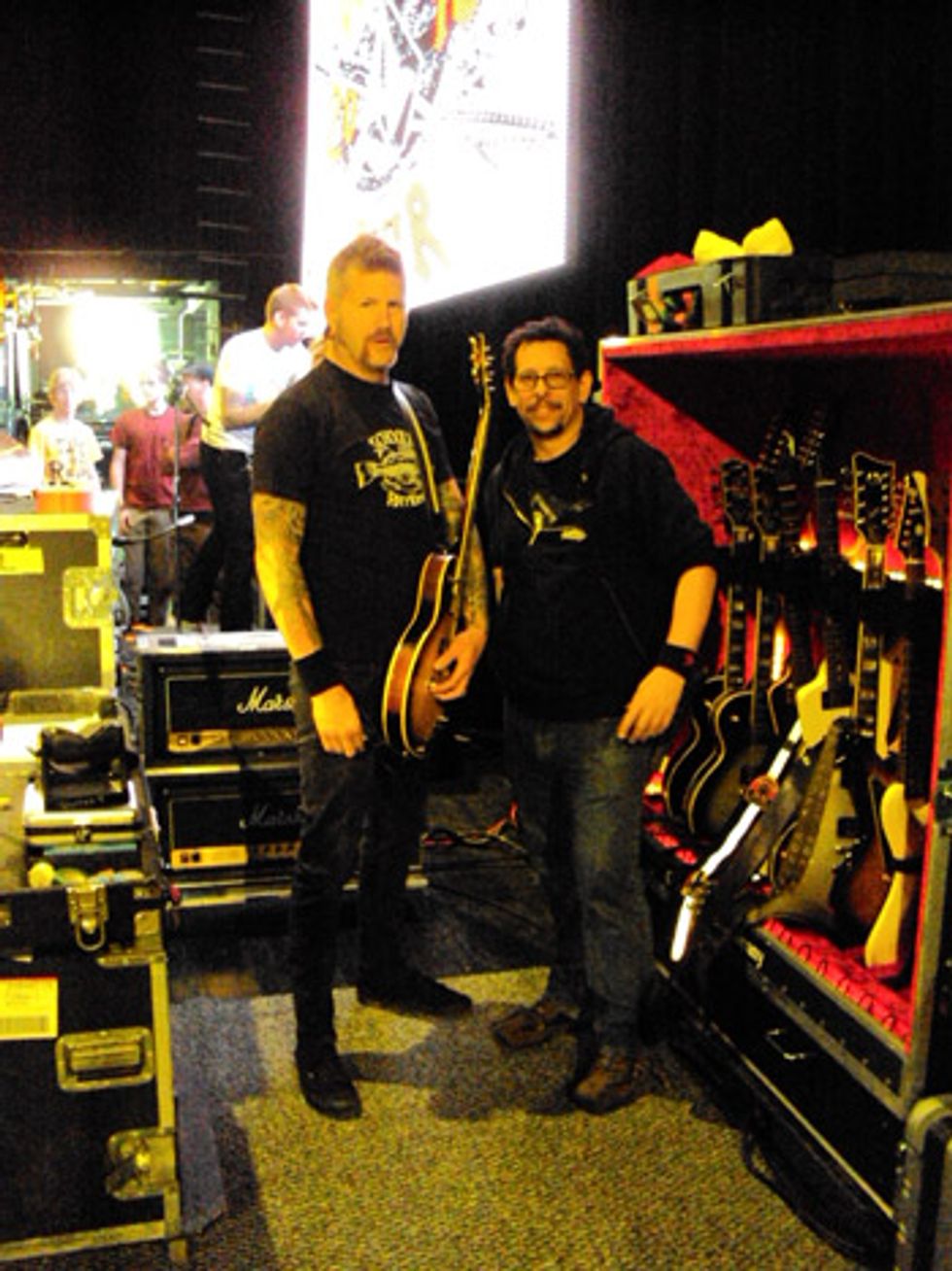 Warren Termini's modest beginnings helping set up and tear down shows for high school friends and family eventually grew to a job with one of the biggest acts in metal: Mastodon's Bill Kelliher. |
And sometimes a random act of kindness gets you a career gig with one of a generation’s biggest guitar heroes.
“I was in El Paso, Texas, watching my friend’s band called At the Drive-In,” recalls Trejo. “I was people one of the five people in the club. I remember seeing Omar flailing onstage and then he broke a string. He grabbed his only backup and broke a string on that one, too. He started to change the string in the middle of the song! [Laughs] So I decided I had to step in and help him out.” After the show, the thankful guitarist went up the kind bar patron who had helped him out earlier and asked if he’d come to the next show. And he’s been right there for Rodr’guez-L—pez ever since.
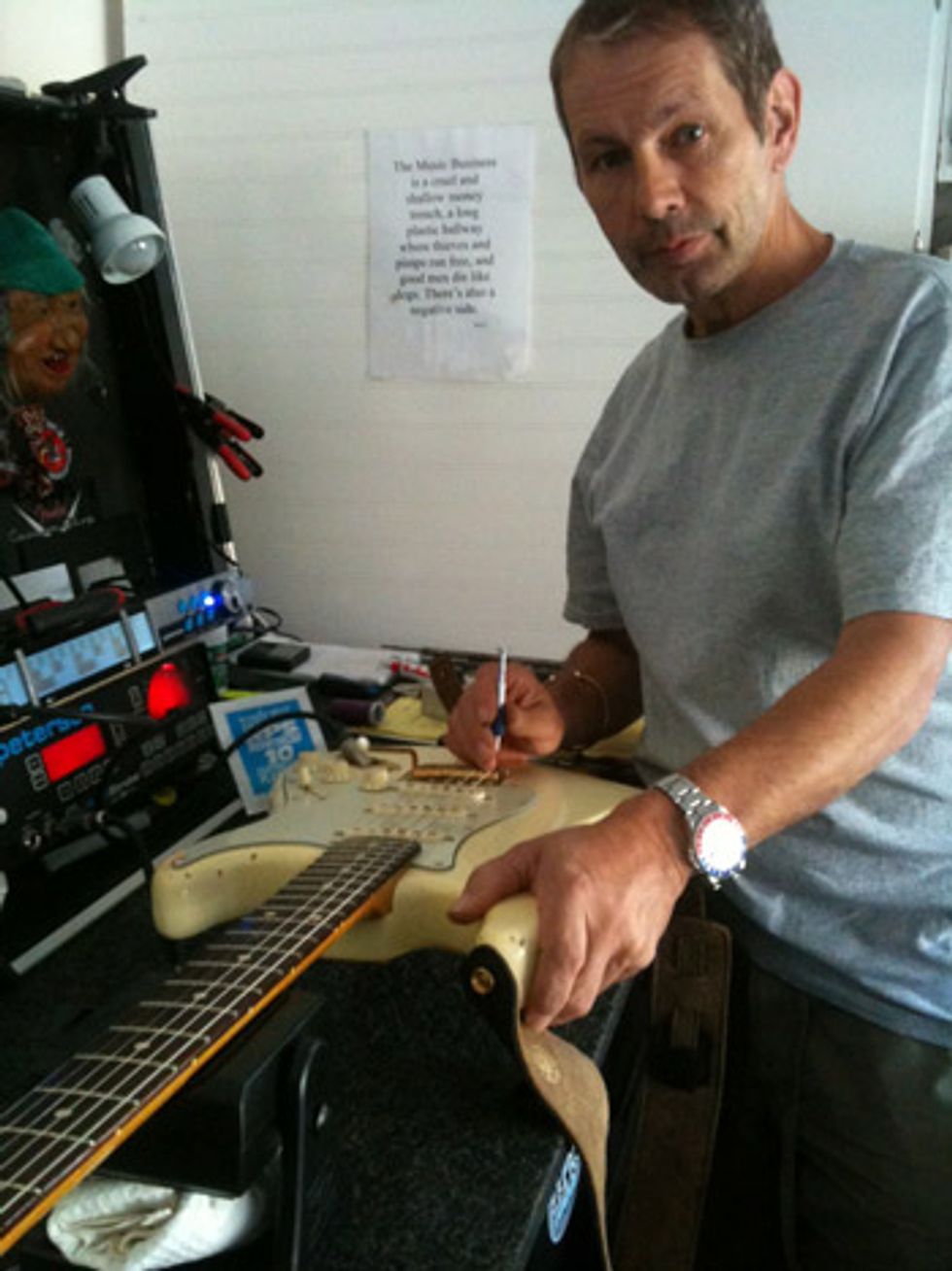 After working as Eric Clapton's tech for 30+ years, Lee Dickson knows a lot about setting up Strats! |
Once a guitar tech partners up with an active touring guitarist and band, life as they know it is over. Nights run into mornings, weeks become months, and cities all began to look the same. But thankfully—and sometimes regretfully—they are spending nearly every waking moment with a traveling musical circus that provides its own entertainment and levity. Every tech we talked to had countless road stories—and those were just the ones they could share.
“Willie Spears, [Clapton’s] old tech, decided that he would slacken all the strings and remove the four screws holding the neck into the body on Eric’s Brownie Strat before the night’s encore,” remembers Dickson, who was working on tour but not yet Clapton’s tech. “Eric came back out for the encore—the crowd was going nuts—and he grabs the guitar from its stand and it falls apart [laughs]… needless to say we were right there with another guitar ready to go.”
While pranks are a time-honored tradition of the road, sometimes techs also get the serious opportunity of stepping out of the shadows and jamming onstage in front of thousands.
“Every once in a great while, Billy and Frank will ask me to come out and play lap steel on a song with them,” says Francis. “I love it. Now people can say a punk rocker has sat in with ZZ Top [laughs].”
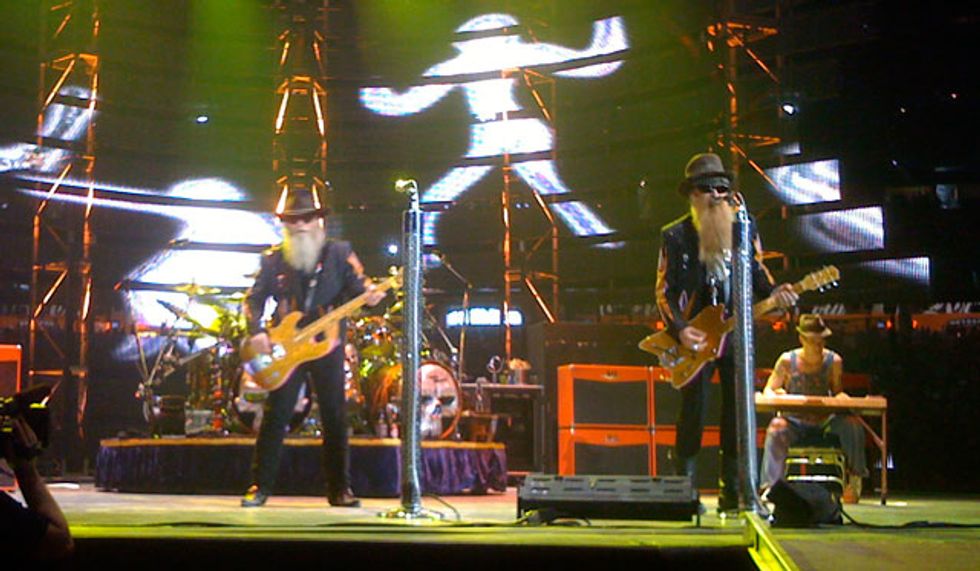
Elwood Francis (far right) pulls double duty as guitar tech and lap steel for ZZ Top from time to time.
But like any live event fueled by spontaneity and adrenaline, concerts can go bad in a note. The tech has to be there to pick up the pieces—gear or otherwise—even if it’s not in the traditional job description.
“I remember one time Sully from Godsmack was really getting into the show and feeding off the crowd’s energy,” recalls Termini. “He grabbed the mic stand and threw it over his shoulder and nailed guitarist Tony Rombola in the head. I had to give him emergency first aid and get him off the stage and into an ambulance.”
Guitarists on the highest level are not exempt from chasing those elusive sounds in their heads, and the tech is there for every pedal swap, amp change, guitar restringing—each performed with a smile and a yes-may-I-have-another attitude. But there is a breaking point.
“I remember the first European Dream Theater tour I did in the mid-’90s when I was working with John Myung and Derek Sherinian,” says Buffa. “It was a hell. We were in Finland or somewhere for Monsters of Rock and Petrucci had been trying new amps and effects every day of the tour for hours at a time—off-day or not. We arrived to the festival and they didn’t have any power, so his tech was happy as hell at that news so he could relax for a bit since we’d been doing this for 14 straight days. Shortly after, John came around the back of the stage and said he had someone run power from the bus so he could use his rig. His tech went to the back of the truck and launched an amp. It landed in this big mud puddle—a few feet from John. [Laughs]. It was really tense, but John was really understanding and nothing more came from it. I’ll never forget that amp flying through the air.”
But for all the frustration that can accompany day-to-day tasks, an acknowledgement of a job well done can make it all worth it—particularly when it comes from a known musician watching the show.
“I was doing a show in Paris with At the Drive-In and it was a battlefield on the stage that night. By second note of the first song, Omar’s cable broke,” says Trejo. “I gave him a new one and before I could turn around he broke three strings on his guitar. So I’m fixing that guitar and I see his only backup guitar go flying over my head—in a panic I hand him back his main guitar with no G-string [laughs]. Then I tend to the drumkit because the drummer broke his snare head. Someone taps me on the shoulder and asks if he can help. I’m so overwhelmed, I say yes. After the show, that stranger came up to me and appreciated all the hard work I was doing and said to keep at it… that stranger was Mike D of the Beastie Boys.”
Honey, I’m home… now what?
Even the most popular bands and ambitious booking agents can’t tour forever. So, what does a tech do when they get home? First and foremost, they reconnect loved ones and reassure their children that, yes, they are their father. Thankfully, today’s technology keeps families closer on the road than ever before—members of the road crew (and band) regularly video chat via Skype or Facetime and stay constantly connected with Facebook and email. And because they are flying all over the world for gigs, techs rack up quite the frequent flyer mileage, so they often make up for lost time with spur-of-the-moment vacations.
But what does a trained tinkering gearhead do when he’s put back into domestic captivity? “When I’m home I still enjoy rat-rodding guitars with very time-consuming and odd art finishes and designs with found objects like rust and bones,” says Francis. “I also consult for a few companies, but being that I like the way things sound when they’re broken [laughs], I doubt they listen to me very much.”
Other techs start up their own companies—within the industry and beyond.
“When I’m off the road I have my own pedal company that I build handwired, point-to-point overdrive and boost pedals,” says Appleton. “I still love to play so I still do session work and jam around town when I’m home in Nashville.”
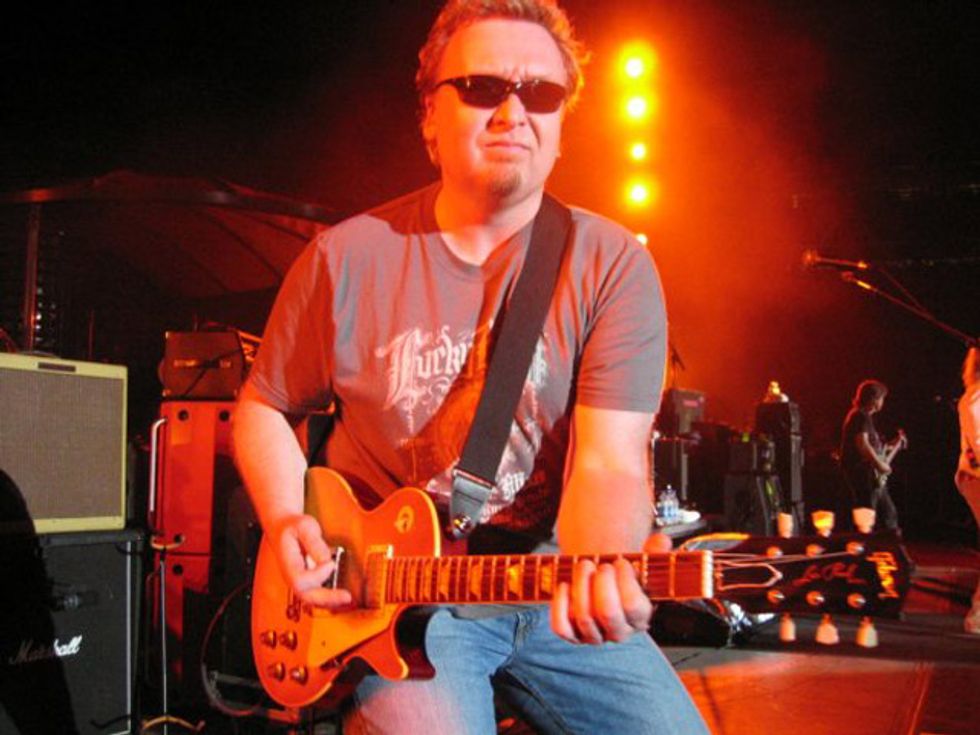
When not supporting Alex Lifeson or Phil Collen on the road, Appleton rocks out with his own band in Nashville.
Termini works in an audio/video business installing home theater systems and smart home technology. He says it’s a tentative backup plan if the road-life and music business becomes too much. Trejo spends quality time in his personal shop setting up and customizing guitars for friends, family, and other musicians. Dickson is working on some pickup projects and other guitar-related ideas with Mojotone and still spends plenty of time writing and playing music. In addition, he’s hoping to find some voiceover work.
And Buffa spends his infrequent free time building racks with longtime friend Mark Synder, including pedalboards for John Petrucci, Peter Frampton, and some of Napa Valley, California’s winery owners who double as gearheads. Buffa’s even used his rack-aptitude to build wooden racks for wineries in California and Brooklyn.
On the road again
Despite the time away from loved ones, never-ending soundchecks, travel nightmares, and budding side businesses, the techs we spoke with don’t stay off the road for long—they are road warriors through and through. It’s most certainly not for everybody, but for this small community of guitar techs, it’s one of their true passions in life. Some have known it since they first realized the job existed, while others stumbled onto the profession through trial and error. No matter the route, the destination is the same—working on some of the most important gear for the biggest guitarists.
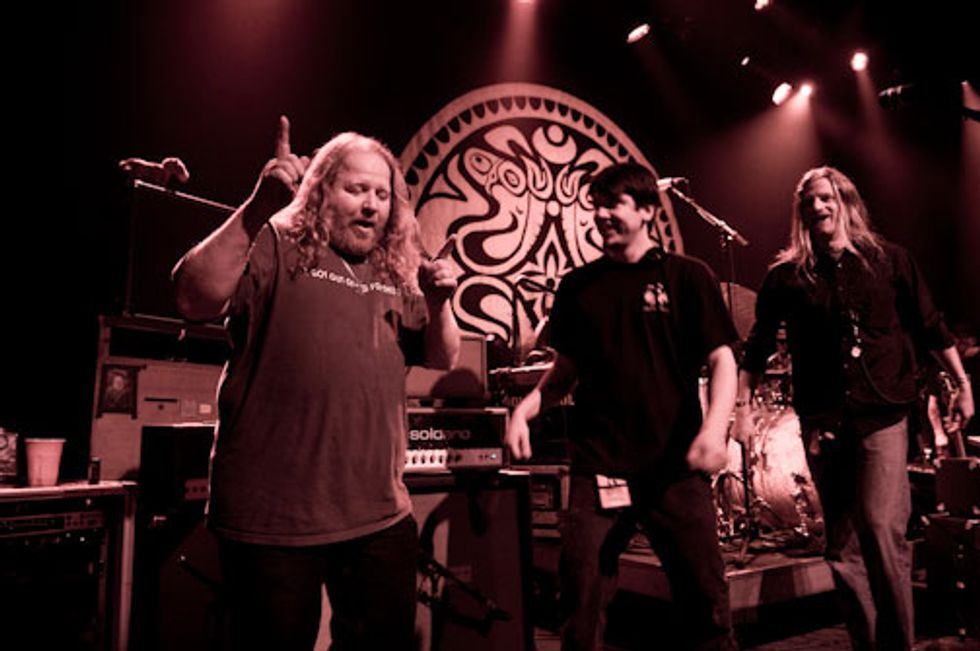
Farmer gets into the groove with the crew onstage at a Mule show
Beyond the mere fascination for gear and admiration of the players they work for, these guys all love being a part of something that touches someone. “I know I can say for all the techs I’ve known and have worked with that it’s just phenomenal being a part of something like the art of music,” says Farmer. “We take pride in our job—however big or small our role—when we see how emotional people get and how music positively effects them. It’s a beautiful way to make a living.”
Remember to check back next week with part 2, which will feature tech tips, pointers, and ideas on how to maximize your tone and be prepared for any gig catastrophe.

